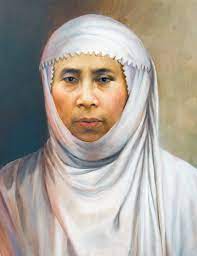 Menunggu respon server .....
Menunggu respon server .....

Nyai Siti Walidah is a woman who was born in Kauman Yogyakarta in 1872. She married in 1889 with Muhammad Darwis or better known as Kiai Haji Ahmad Dahlan. His father was a head of the Keraton, H. Muhammad Fadlil bin Kiai Penghulu Haji Ibrahim. Meanwhile, his mother, known as Nyai Mas, comes from Kauman Village and was raised in a traditional religious environment. Since childhood he never received formal education in public schools because at that time the people of Kauman thought that formal education in schools for girls was seen as reducing morals. Therefore, the education that Siti Walidah received was given by her parents about various aspects of Islam including Arabic and the Qur'an.
In this 'Aisyiyah institution, Nyai Ahmad Dahlan tries to introduce his thought that women have the same right to seek knowledge as high as possible. Nyai Ahmad Dahlan realized that he had a very big obligation in education to lift his people from the shackles of ignorance. From this thought of Nyai Ahmad Dahlan, he wanted the Indonesian people, especially women, to be more advanced in education so that they were free from colonialism. This proves that the spirit of Islam is able to encourage the progress of women.
In a study forum "Santri Cendekia Forum" organized by the Tarjih Muhammadiyah Center, a study theme was carried out on "The Thought of Nyai Siti Walidah's Islamic Modernization" (1/2). The study, which was held via Zoom, invited resource persons, namely Dr. Adib Sofia, S.S., M.Hum who is the Head of Aisyiyah Center and the Editorial Board of Aisyiyah. On that occasion he explained about the five modernizations of Islam carried out by Nyai Siti Walidah, including:
Gender Equality; independence
Nyai Ahmad Dahlan said that Heaven and hell for women are determined by themselves and women are partners for men in terms of worship and struggle.
Relationship
In addition to having extensive association with big figures, he is also a figure who never lowers himself and always positions himself as an advisor, so he will always give a lot of advice to people.
Mass Communications
He always breaks down negative assumptions about women; women as kanca wingking (his position is behind women). In addition, he also spoke about the existence of forced marriages, leaving old-fashioned understanding and daring to face the reproaches of the old people. The pressure on women has opened the discourse of Nyai Ahmad Dahlan in fighting for women. At its peak he always established a boarding house for women. The boarding house focuses on practicing speech and other special education skills for women.
Leadership
April 22, 1917 coincided with the 27th Rajab 1355 H The organization of 'Aisyiyah was inaugurated. This organization is an organization engaged in education, health, social welfare, and community empowerment. At the beginning of the establishment of 'Aisyiyah, Nyai Siti Walidah did not immediately become chairman, but she always tried to oversee what was needed by 'Aisyiyah. He became the leader of 'Aisyiyah after 4 years of Aisyah's existence, namely in 1921-1926 and 1930. She also always cared and put her students first, promoted her students, and struggled to manage the Maghreb School (Sopo Tresno, 'Aisyiyah) and ABA Kindergarten. Through the Sopo Tresno association, Nyai Dahlan tried to instill awareness in women about the benefits and objectives of education.
Empowerment; integrity
At the end of her life, before the death of Nyai Siti Walidah, she always gave a message/will, namely that in carrying out Muhammadiyah-'Aisyiyah, what must be done is to improve the life of the Indonesian people based on the noble ideals of achieving independence. He advised "I entrust Muhammadiyah and 'Aisyiyah to you as the late KH. Ahmad Dahlan left it. Entrusting means continuing the struggle of Indonesian Muslims towards improving the lives of the Indonesian people based on the noble ideals of achieving independence”. Therefore, Muhammadiyah and 'Aisyiyah cannot be separated from the struggle of all Indonesian people to achieve a civilized, just and prosperous society.


